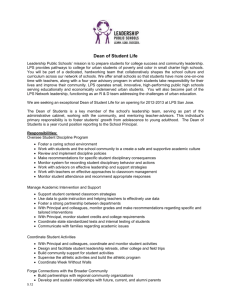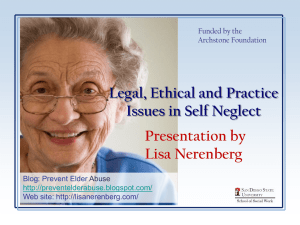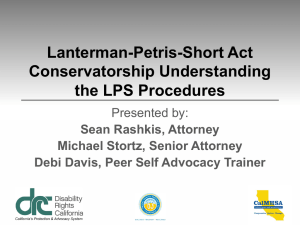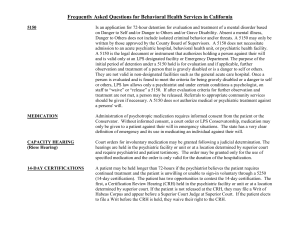Hospitalized - Steve Shorr Insurance
advertisement
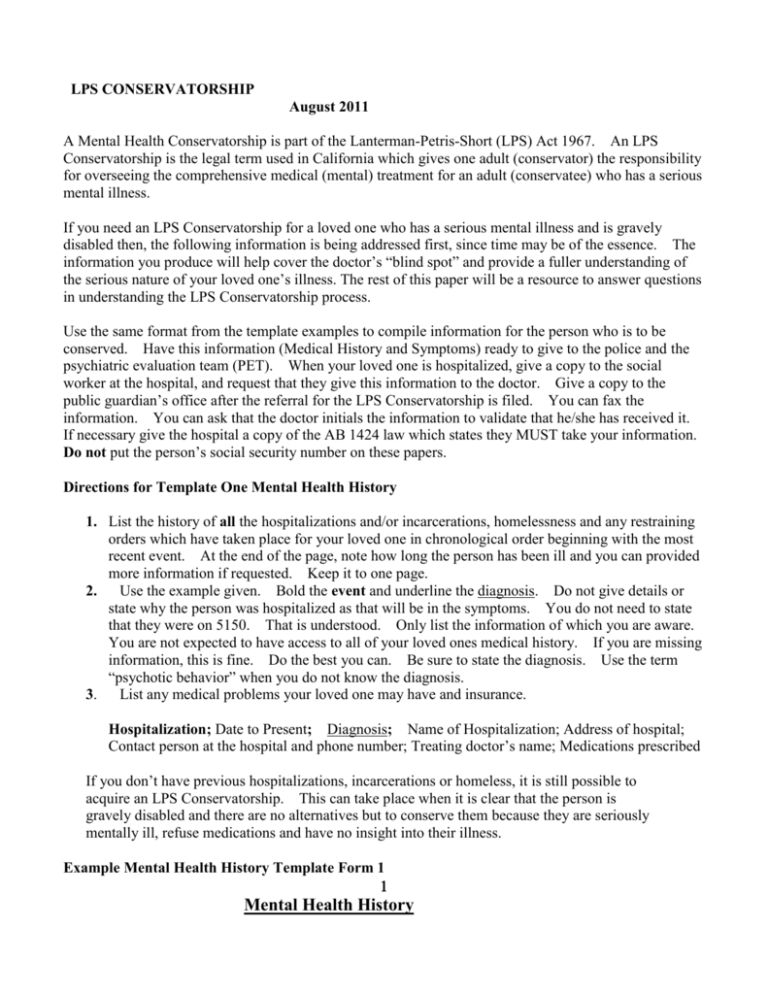
LPS CONSERVATORSHIP August 2011 A Mental Health Conservatorship is part of the Lanterman-Petris-Short (LPS) Act 1967. An LPS Conservatorship is the legal term used in California which gives one adult (conservator) the responsibility for overseeing the comprehensive medical (mental) treatment for an adult (conservatee) who has a serious mental illness. If you need an LPS Conservatorship for a loved one who has a serious mental illness and is gravely disabled then, the following information is being addressed first, since time may be of the essence. The information you produce will help cover the doctor’s “blind spot” and provide a fuller understanding of the serious nature of your loved one’s illness. The rest of this paper will be a resource to answer questions in understanding the LPS Conservatorship process. Use the same format from the template examples to compile information for the person who is to be conserved. Have this information (Medical History and Symptoms) ready to give to the police and the psychiatric evaluation team (PET). When your loved one is hospitalized, give a copy to the social worker at the hospital, and request that they give this information to the doctor. Give a copy to the public guardian’s office after the referral for the LPS Conservatorship is filed. You can fax the information. You can ask that the doctor initials the information to validate that he/she has received it. If necessary give the hospital a copy of the AB 1424 law which states they MUST take your information. Do not put the person’s social security number on these papers. Directions for Template One Mental Health History 1. List the history of all the hospitalizations and/or incarcerations, homelessness and any restraining orders which have taken place for your loved one in chronological order beginning with the most recent event. At the end of the page, note how long the person has been ill and you can provided more information if requested. Keep it to one page. 2. Use the example given. Bold the event and underline the diagnosis. Do not give details or state why the person was hospitalized as that will be in the symptoms. You do not need to state that they were on 5150. That is understood. Only list the information of which you are aware. You are not expected to have access to all of your loved ones medical history. If you are missing information, this is fine. Do the best you can. Be sure to state the diagnosis. Use the term “psychotic behavior” when you do not know the diagnosis. 3. List any medical problems your loved one may have and insurance. Hospitalization; Date to Present; Diagnosis; Name of Hospitalization; Address of hospital; Contact person at the hospital and phone number; Treating doctor’s name; Medications prescribed If you don’t have previous hospitalizations, incarcerations or homeless, it is still possible to acquire an LPS Conservatorship. This can take place when it is clear that the person is gravely disabled and there are no alternatives but to conserve them because they are seriously mentally ill, refuse medications and have no insight into their illness. Example Mental Health History Template Form 1 Mental Health History Joe Doe’s Mental Health/Medical History Hospitalized; January 1 to Present; Diagnosed Schizophrenia; Cedar Sinai Hospital; Beverly Blvd., Los Angeles; Dr. Rational Thinker @ 333-444-5555; Medications Seroquil and Risperdal Hospitalized; December 12- 28, 2010; Diagnosed Schizophrenia; UCLA Harbor; Dr. Stone @ 222-333-4444; Medications Lithium Homeless; November 5- December 12, 2010; Exhibiting psychotic behaviors Hospitalized; September 10- 23; Diagnosed Bipolar; College Hospital @ Ceritos; Dr. Roberts @ 213-222-4444; Medications Lithium Incarcerated March 2- April 4; Diagnosed psychotic behaviors; Twin Towers Homeless; January 3- March 1; Exhibiting psychotic behaviors NOTE: Do not give Biaxin or Haldal; Has diabetes; Insurance medi-cal Directions for Template Two Mental Health Symptoms and Characteristics 1. Prepare a short detailed summary of the DSM IV symptoms of the mental illness as it applies to your loved one. Use the template format below. Use short phases. Bold the titles and bullet your examples. Example Mental Health Symptoms and Characteristics Template Form Two 2 Symptoms and Characteristics Visual hallucinations Sees ghosts, dead people Sees people with pointed chins and beaked noses Auditory hallucinations Laughs or smiles for no reason Hears television speaking to him/her (not the normal show) Delusions- includes grandiose delusions Feels he/she is Christ Plans to open chain stores and make millions Belief in the delusions Goes to the hospital to raise people from the dead Puts knives around bed to protect him/her from dead Disorganized speech Rapid speech Does not make sense in conversation; can’t follow conversation Disorganized behavior Incapable of following directions Leaves stove on Parks car in middle of intersections Out of control spending sprees Poor Hygiene Goes for days without showering Smells bad Paranoid thinking People are running him/her off the road People are looking at him/her Mother/ Father molest him/her Government is watching him/her Behaves in accordance to his/her paranoid thinking Throws food in garbage because it is poisoned Destroys cell phone, TV etc because FBI are listening Walks in front of traffic Mood Swings Cycles between moods- highs and lows Becomes extremely agitated Unable to meet the needs of daily functioning Goes into other people’s houses uninvited to get food, use computer Does not pay for items in stores, just takes things Can’t handle finances 3 Difficulty understanding and following directions Cannot process information Cannot follow multiple directions Inability to maintain gainful employment Cannot keep a job Blames everyone for problems Inability to recognize their illness and difficulties associated with the illness Refuses medication or will not stay on medication Gravely disabled (Defined: Maynot come and live at home, Has no place to live Has no income and cannot provide for self or hold a job Has no insight into illness and therefore will not take medication and has history of non compliance Might not eat food because it is poisoned 4 UNDERSTANDING LPS CONSERVATORSHIP 1. 2. 3. 4. 5. 6. Why is an LPS Conservatorship important to obtain? What is an LPS Conservatorship? How long is an LPS Conservatorship granted? Who can be conserved? What types of LPS Conservatorships do the courts grant? What are the responsibilities of the conservator with respect to the conservatee? 7. What are the responsibilities for the conservatee with respect to the estate? 8. What qualifies a person for an LPS Conservatorship? 9. How do I know if my loved one is considered a harm to self or others? 10. What defines gravely disabled? 11. How does a person get a gravely disabled status? 12. Who can be the conservator? 13. Why is it necessary to seek an LPS Conservatorship? 14. How much does it cost to acquire an LPS Conservatorship? 15. Where is the conservatorship court? 16. What is the usual process in seeking an LPS Conservatorship? 17. What is a Reise hearing? 18. Who can initiate a 5150 hold? 19. How do I get hospitalization for my loved one? 20. Does my loved one need Medical or insurance to get hospitalization? 21. Does my loved one need SSI or Social Security to be hospitalized? 22. All these officials, who are they and what are their roles? 23. What powers and responsibilities are given when the conservatorship is granted? 24. What is imposed on the Conservatee? 25. Why should I keep a journal? 5 1. Why is an LPS Conservatorship important to obtain? An LPS Conservatorship is a tool which gives the conservator the power to work with the doctor to achieve treatment for a mentally ill individual beyond the standard of “stable.” It helps the conservator in guiding the treatment team to get your loved one’s life back as they knew it to be before they became ill. 2. What is an LPS Conservatorship? A Lanterman Petris Short (LPS) Conservatorship is the legal term used in California which gives one adult (conservator) the responsibility for overseeing the comprehensive medical treatment for an adult (conservatee) who has a serious mental illness. 3. How long is an LPS Conservatorship granted? An LPS Conservatorship is granted for one year term but can be renewed for another year. It is important to pay attention to the requirement given for renewal from the court and mark the date on your calendar. 4. Who can be conserved? Conservatorships are only granted by the court for adults with a mental disorder and who are gravely disabled as listed in the Diagnostic and Statistical Manual of Mental Disorders (DSM IV). These are granted for people with: Schizophrenia Bi-Polar disorder (Manic Depression) Schizoaffective disorder Clinical Depression Obsessive compulsive disorder 5. What types of LPS Conservatorships do the courts grant? There are two types of LPS Conservatorship which the court can grant. The first is an LPS Conservatorship of the Person. A qualified psychiatrist initiates a petition to the public guardian’s office, which in turns petitions the court for the conservatorship. The second is an LPS Conservatorship of the Estate. The public guardian’s initial investigation determines if there is a need for this conservatorship. The family can also request that the public guardian petition the court for the estate conservatorship, or the family can at some time later petition the court. The doctor is not involved with this matter. 6. What are the responsibilities of the conservator with respect to the conservatee? As a conservator you will be responsible for approving a place for the conservatee to live, and approving the treatment and the medication program for the conservatee. You should also participate in developing and overseeing a treatment plan that supports and encourages the conservatee to regain his/her life as close as it was prior to the illness. It is also a good idea for you to learn about mental disorder. This can be done by taking the free Family to Family class which is offered by NAMI. 7. What are the responsibilities for the conservatee with respect to the estate? As conservator of the estate, you will be responsible but not personally liable for all financial 6 matters pertaining to the estate. You don’t need an estate conservatorship to be the representative payee for their SSI benefits. 8. What qualifies a person for an LPS Conservatorship? To qualify for the LPS Conservatorship, the person must be gravely disabled, have a serious mental illness and there are no other alternatives to help them in the recovery of their impairment. 9. How do I know if my loved one is considered a harm to himself or others? You do not need to wait until your loved one tries to commit suicide or tries to hurt someone or themselves before you seek treatment for them. If your loved one has delusional conversations expressing the need for knifes or other items to protect him/her self; if they walk in front of moving cars, oblivious of the vehicles; if they seemed obsessed with others killing them; if they leave on gas burners when cooking; or are losing weight because they are afraid the food is contaminated, these are the red flags that will help you get your loved one hospitalized which is usually the first process in acquiring a conservatorship. 10. What defines gravely disabled? Gravely disabled means the mentally ill person cannot take care of his/her basic needs for food, clothing and/or shelter. With that said, the state feels that if another person provides for their food, clothing or shelter, or if a person can get food or clothing from the shelters then they are not considered gravely disabled. The fact that a mentally ill person lives on the streets does not mean that they are gravely disabled either. With this said, it is still possible to get the person in treatment and gain conservatorship for them even when they are living on the street. 11. How does a person get a gravely disabled status? When a person with mental illness is hospitalized or incarcerated for being a harm to self or others, then the family or others must stress to the doctor that the person does not have a place to live. You must stress that the ill person may not live with the family and that they have no apartment to which they can return. This is very important in requesting an LPS Conservatorship. This establishes “gravely disabled” for the purposes of the LPS Conservatorship, along with the fact that the person is not, nor has been compliant with medications. To prove that a person cannot provide food or clothing is extremely difficult because if they can go to the Salvation Army or a dumpster to acquire clothes, pan handle for money, or find the food kitchens; then they are not considered gravely disabled. When a person is basically a vegetable living on the street, and someone provides food for them, they are not considered gravely disable, even if they have lost substantial weight, and are too sick to know they are sick. 12. Who can be the conservator? Public guardian- paid for by the state Private professional conservator You, a relative or a friend- the state prefers a family member for conservator 7 13. Why is it necessary to seek an LPS Conservatorship? If a person with mental illness does not have insight into their illness, and they are not compliant with their medications, it is very wise to seek an LPS Conservatorship to keep them safe, out of the revolving doors for the hospitals and out of jail but especially to help them on their road to recovery. Because treatment and medication can be given under the LPS Conservatorship, it has been found that the brain will not have to continue To suffer further damage. An LPS Conservatorship is one significant tool which will help your loved one regain his/her life. 14. How much does it cost to acquire an LPS Conservatorship? You can hire an attorney to help you acquire the conservatorship, but this is not always necessary. The attorney cannot force the doctor to seek the conservatorship. Also an attorney is somewhat expensive, as the average legal fee is approximately $8,000.00. The public guardian submits a report to the court recommending that the person be conserved or not, and whether or not a family member should be appointed as the conservator. The county counsel who is the public guardian’s attorney, represents and upholds the public guardian’s recommendation. From my experience, the county counsel deals with these situations every day. They are very knowledgeable and understand the proceedings of the conservatorship court. If the court sees a need for an attorney to be assigned to the family conservator, then the judge will select from the court’s panel of attorneys at the court‘s cost. for 15. Where is the conservatorship court? In Los Angeles County, the court is located at: 1150 N. San Fernando Road, Los Angeles, CA 90065-1100. This is an obscure small building with the exterior that does not resemble the usual appearance of court houses. Don’t confuse this court house with the “Behavioral Courthouses” the mentally ill. I suggest that you dress warmly as they usually keep this building very cold. 16. What is the usual process in seeking an LPS Conservatorship? First, the person who exhibits harm to self or others is placed on a 72 hour hold AKA 5150 hold by a qualified police officer, psychiatrist or mental health personnel. Usually someone will call either the police or the crises intervention team to initiate this process. To prevent harm to anyone, the police are there to make sure the person is contained. The crisis intervention team evaluates the individual and makes a recommendation for a 72 hour hold. Note that when the person is transported they are usually handcuffed to keep them safe. In the hospital, the psychiatrist who evaluates the person may initiate a 14 day hold to continue the treatment for stabilization. A 14 day hold must have a Probable Cause hearing within 4 working days. Often families are not aware the probable cause hearing has taken place. This hearing allows the hospital to hold the patient for 14 days. During the 14 day hold the doctor may request an LPS Conservatorship investigation from the public guardian‘s office. The public guardian will review the application and may petition the court for a Temporary Conservatorship AKA T-Con. They will also set the date for the LPS Conservatorship court hearing. The person will be held in the hospital under the T-Con until the 8 court hearing. The T-Con can hold the person in the hospital up to 30 days. The psychiatrist who initiates the LPS Conservatorship request with the public guardian. The public guardian will visit and evaluate the patient and make a recommendation to the court to either proceed or dismiss the LPS Conservatorship case. It is important to contact the public guardian’s office and submit the history and symptoms papers. Also, be sure to give a copy of these papers to the psychiatrist as soon as the person is taken to the hospital. If you don’t know which hospital the person will be taken to, then you might give those papers to the crisis intervention team to deliver to the hospital. You can call the DMH Family Advocate or Patient Advocate to locate your loved one if you do not know where they were transported. An estate conservatorship is initiated through the public guardian’s office and not through the psychiatrist. The family member may discuss the estate issues with the public guardian investigator. Or, the family conservator may request, if needed, the Estate LPS Conservatorship even after they are appointed as the conservator. 17 What is a Riese hearing? This hearing is held at the hospital, often because the patient is becoming violent and needs medication, but is unwilling to voluntarily to take medications. It is a capacity hearing that is held to require the patient to take medication to calm him/her. 18. Who can initiate a 5150 hold? Certain trained designated officials may initiate the 72 hour hold/section 5150. Police officer Approved mental health professional Approved psychiatrist Transportation to the hospital must be arranged by one of the above. In some counties if beds are not available, then the Crisis Intervention Teams may not respond because they have no place to put the person. Therefore, it is usually wise to contact the police first and have them contact the crisis teams. The police have access to the beds. Otherwise, if a bed is not available, then the crisis team would not able to process the transportation, resulting in having to release the person. 19. How do I get hospitalization for my loved one? There are many ways to get hospitalization. Often, a person is willing to go to the hospital because they know something is not right. If they are not willing to go and they are harmful to themselves or others, you should contact the police and explain the situation. It is important to let the police know why you think the person is a possible harm to themselves or others. Just by being psychotic does not, by law, allow for a 5150 hold. If your loved one has private insurance or Medi-Cal or medicare, then the police can transport your loved one to a hospital covered by the insurance. Otherwise a county hospital is where they will usually transport them. Generally county hospitals employ good psychiatrists and offer very good treatment. 9 20. Does my loved one need Medical or insurance to get hospitalization? No. But if you do not have insurance, the psychiatrist will tend to stabilize and put your loved one back on the streets. You will have to fight like hell to get them the LPS conservatorship. 21. Does my loved one need SSI or Social Security to get hospitalized? No. But I suggest that you go immediately to the social security office and apply for SSI for your loved one. When he/she is hospitalized this is the best time to apply. This establishes an “application date.” It is also important to request to be the “representative payee.” The doctor can complete a form to be given to the SS office stating that the patient is refusing to sign papers and is not capable of managing their money. When SSI is granted, the payments will be retroactive to the date which you submitted the initial application. The social security office will give you forms for you to fill out and have your loved one sign. Also, a doctor will evaluate your loved one for approval for SSI. If they are turned down for SSI, you need to appeal the decision within the 60 day time period. When you are approved for SSI then usually MediCal is approved simultaneously. Sometimes you can get Medi-Cal without SSI. Therefore, also apply for MediCal. 22. All these officials, who are they and what are their roles? Office of the County Counsel- represent Los Angeles County in all legal proceedings, including Public Guardian in establishing conservatorship; Public County Counsel- represents the family Public Defenders- represents person to be conserved and not the family Public Guardian- investigates LPS Conservatorship referrals and makes recommendations to the court District attorney- represents the hospitals with involuntary treatment; also can be more involved in criminal matters Court- ensures fairness and compliance with the laws in all proceedings involving involuntary treatment and conservatorships 23. What powers and responsibilities are generally given when the conservatorship is granted? Conservator Powers With Respect to the Conservatee To place the conservatee in a private residence, licensed psychiatric or non-psychiatric residential care facility, board and care, nursing or other State licensed facility where the conservatee has free access into or out of the premises To place the conservatee in a portion of a private acute care psychiatric hospital, State or County hospital operated by the Regents of the University of California or by the United States Government, where the conservatee has free access into or out of the hospital. To place the conservatee in a licensed medical acute psychiatric hospital or psychiatric nursing facility (Institute for Mental Disease AKA IMD) or other State or County licensed facility, where the conservatee does not have free access into or out of the premises. Pending further order of the Court, this power shall terminate within one year. To require the conservatee to have treatment related specifically to remedying or preventing the recurrence of his her being gravely disabled. To require the conservatee to accept psychotropic medications. 10 24. What limitations are suspended for the Conservatee? These limitations can be reinstate with the courts approval. The privilege of possessing a license to operate a motor vehicle is suspended. This power can be returned with the courts approval. The conservator can ask the psychiatrist to petition the court to allow the person to drive. It is up to the court to grant permission for driving and it is the DMV that evaluates and issues the license. Don’t ask for this at the LPS hearing. The privilege of possessing, controlling or maintaining custody of a firearm or any other deadly weapon is suspended. The right to refuse or consent to psychiatric treatment related specifically to the conservatee’s being gravely disabled. Another words, they must take the medications approved by the conservator. The right to enter into any contract, in which the consideration for performance is money or property, is suspended. This power can be returned to the conservatee with the courts approval. The right to vote. This too can be returned to the conservatee with the courts approval. The right to refuse or accept medical treatment is suspended. The court must approve the medical treatment for the conservatee. 25. Why should I keep a journal? It is important to keep a journal to document hospitalizations, medications, behaviors and symptoms and their side effects. Resources: California Welfare and Institute Codes 5150, 5250, 5332 available on the internet Los Angeles Office of the Public Guardian (Kathie Van Dyke)– public conservator 213-974-0549 SSI and SS 800-772-1213 Medi-Cal 877-597-4777 LA County of Mental Health 800-854-7771 Search the internet for LPS Conservatorship (not conservatorship) Helen Ditko (LA Department of Mental Health) family advocate for conservatorship; Call her to help get the doctor to initiate the conservatorship 213-738-3948 Dr . Roderick Shaner, LA Medical Director for DMH 213-738-4603 Mary Marx, LA Clinical District Chief for DMH Countywide Resource Management email mmarx@dmh.lacounty.gov 323-226-4447 Jeffrey Kohn, LA Patient Rights Advocacy 213-738-4873 11 KEEP A SENSE OF HUMOR TO SURVIVE THIS ORDEAL Note: An LPS Conservatorship is a powerful tool to help your loved one regain their life very closely as they knew it before the illness. That is, if you can get treatment early enough in this disease your loved one can and will live a “normal” life. The LPS gives you the power to work with the doctor to find the best medications for your loved one. I strongly suggest that you search the procedures used in the TMAP (from Texas psychiatric process for establishing medications) and work with the doctor. In a nut shell, you are searching for the least amount of medications and the right amounts. Don’t be afraid to search for some of the latest medications which tend to have wonderful results and virtually no side-effects. Therapy is also vital in combinations with the medication. Cognitive Therapy tends to help our loved ones recognize their illness and also learn how to handle their “triggers.” NAMI offers free Peer to Peer classes for people with these illnesses and free Family to Family classes for the family members. These are powerful classes in helping people understand and deal with these illnesses. Gail Evanguelidi 310-288-9749 California; cell 337-781-7609; 337-981-8981 Louisiana 12 13


